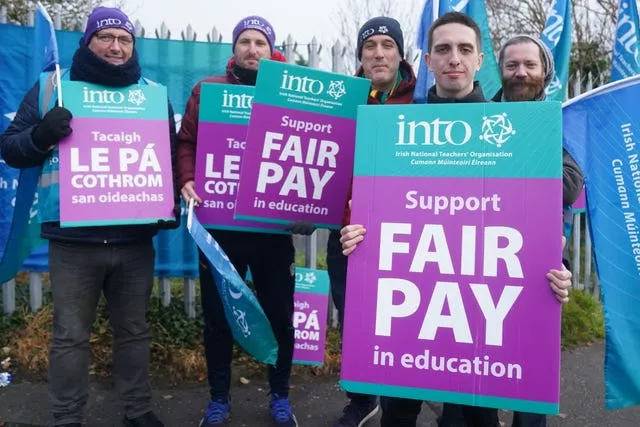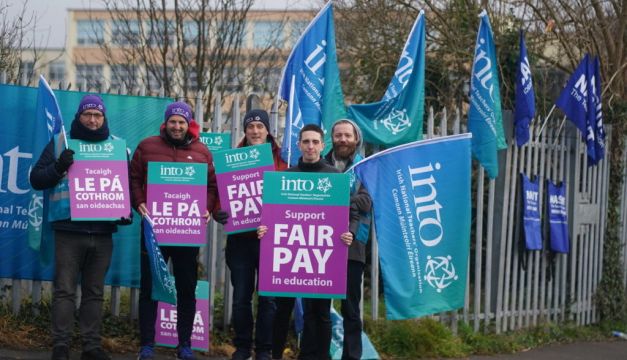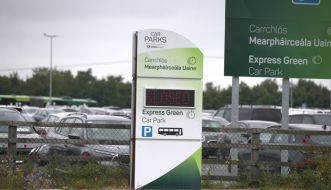Teachers in the North have said there is “real anger” as thousands went on strike on Wednesday over an ongoing pay dispute.
All five major teaching unions, including the National Association of Head Teachers (NAHT), were all on strike together for only the second time.
The 12-hour strike action that ended at 12 noon on Wednesday saw disruption at schools across Northern Ireland, many of which will also be affected on Friday when some school support staff and Translink workers go on strike.
Members of the Northern Ireland Teachers Council (NITC) announced that they are planning an additional four full-day strikes to take place in the spring term on dates to be agreed.

Paddy Ferran, a senior teacher and union representative at St Patrick’s Academy, Dungannon, Co Tyrone, was on the picket line on Wednesday morning alongside colleagues from the neighbouring St Patrick’s College.
“Somebody coming into the teaching profession at 22, 23 years of age, is approximately a third less well paid than somebody across the water or south of the border,” he said.
“So what teachers are asking for is pay restoration and pay parity – you’re doing the same job as someone else in another jurisdiction, you should be getting the same pay.”

In the absence of a Stormont executive, the budget for Northern Ireland has been set by the Secretary of State Chris Heaton-Harris.
Northern Ireland is on course for an overspend of £450 million (€520 million) and would be nearly £1 billion if a pay rise for public sector workers was to be awarded.
Mr Ferran said local politicians need to make the case for pay awards on behalf of health and education workers.
“It’s not the job of the teacher in the classroom to decide the priorities of the budget, but it has been very, very clear over the last number of years that both health and education have just suffered,” he said.
“They’re not top of the list of priorities, despite what we’re being told.
“We’ve heard little from our local politicians in terms of support for either for our health staff in particular or our education staff.
“So it is up to the Stormont politicians to make the case for their local workers since, three years ago, when we were trying to deal with Covid, both of our education staff and our health staff were very much classified as key workers.
“And it doesn’t look as if there’s any appetite from our politicians to actually treat them for what they’re worth.”

Senior teacher at St Patrick’s Academy James Slater said there was “real anger” from teachers at having to go on strike again due to the continued lack of resolution to the pay dispute.
“The fact that we are so behind with every other jurisdiction and down south in terms of pay, it’s been a long time,” he said.
“We’ve had a couple of half-day strikes, we’ve had a full-day strike as well, we don’t do it lightly.
“We’re all sitting here and we’d rather be inside teaching the children getting on with our jobs.”
He added: “But there has to be a fairness to it.
“I think the reality, if you’re the general public, and you’re looking inside thinking: ‘What are our teachers are being affected by?’ A lot of teachers now are working a second job, for example.
“There’s a real shortage of staff and I think that’s coming down the track here as well, it’s already in England, Wales and Scotland despite the fact that they have had pay rises.
“The shortage of staff and teaching, generally, in the next 10, 15 years, I think will be really acute.
“And that’s something that the general society needs to be aware of as well, but there’s real anger at the minute.”

David Nolan, Northern Committee member of INTO and teacher at St Joseph’s Boys’ High School, Newry, said it is “about time” teachers in Northern Ireland received the same pay as teachers in Britain.
“We’re doing exactly the same work, exactly the same job, for a lot less pay, so this is about trying to restore that parity,” he said.
Mr Nolan added: “We don’t want to have to stand here and strike which is going to affect the children that we teach, but we have our own children, you know I have to feed my own children, put shoes on my own children.
“Definitely household bills for all of us have been noticeably higher than they have been in the past.”

Chair of the NITC, Jacquie White, said the four further days of strike action in the spring, in addition to today’s half-day strike, have been planned as there is “no sign” that the Department of Education or the Secretary of State are going to settle the dispute.
“It is high time they realised that our members are serious about seeking an urgent resolution to this untenable situation, and for that reason we are announcing five days of strike action,” she said.
“No teacher wants to take this action; however, we now feel that management side has left us with no other option.”
On Wednesday a delegation of NAHT representatives delivered a letter, signed by 444 school leaders from across Northern Ireland, which called on British prime minister Rishi Sunak to intervene and provide the funding needed to deliver a pay increase for school leaders and teachers.

Justin McCamphill of the NASUWT and vice-chair of NITC said the pay gap for teachers in Northern Ireland in comparison to the rest of Ireland and Britain has reached “epic proportions”.
“Teachers simply cannot continue as if everything is normal.
“Teachers are angry and are prepared to step up strike action in order to achieve a level of pay which allows them to provide for their families. Urgent action is now needed to address our concerns,” he said.
“The Secretary of State needs to come out of hiding and ensure that the education system in Northern Ireland is properly funded.”
Mark McTaggart, of the Irish National Teachers’ Organisation (INTO) and secretary of NITC, said: “It was the teachers and school leaders who put their own health and that of their families at risk during the pandemic to allow other key workers the opportunity to provide the essential work in caring for those who suffered with Covid.
“Teachers have a right to receive a salary that truly reflects their value to society,” he said.
“The continued failure by those who hold the purse strings to provide this has the potential to have a devastating effect on the life chances of the children and young people in their care.”
Pauline Buchanan, of the National Education Union (NEU), said teachers are “under-valued, and under-resourced”.
She said: “Teachers carry out vital work for the children of today, the workforce of tomorrow, and shape education for generations to come and deserve, at the very least, a decent pay rise – now.”
A Northern Ireland Office spokesperson said the UK government has no authority to negotiate pay in Northern Ireland and it is for the relevant NI departments to negotiate pay policies.
“It remains the Secretary of State’s priority to see the return of locally elected, accountable and effective devolved government, which is the best way for Northern Ireland to be governed,” they said.
“The Secretary of State has commissioned a range of information and advice from the Northern Ireland Civil Service on potential measures to raise more public revenue, or otherwise to improve the sustainability of public finances in Northern Ireland, for an incoming Executive to consider.”







